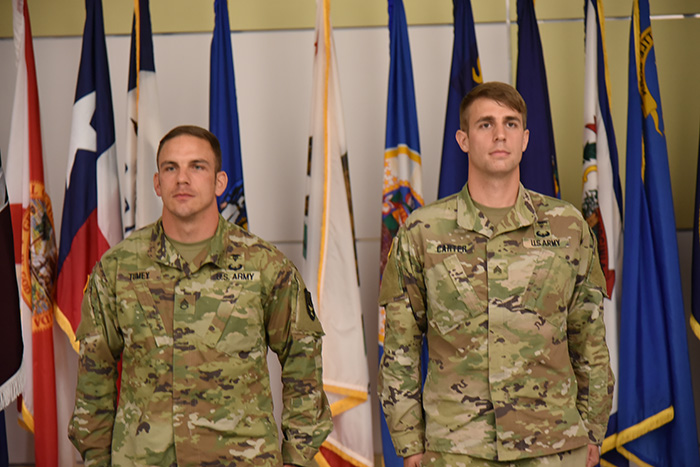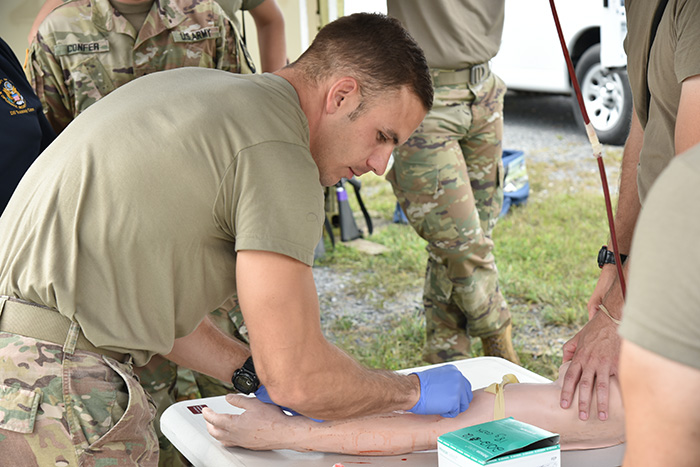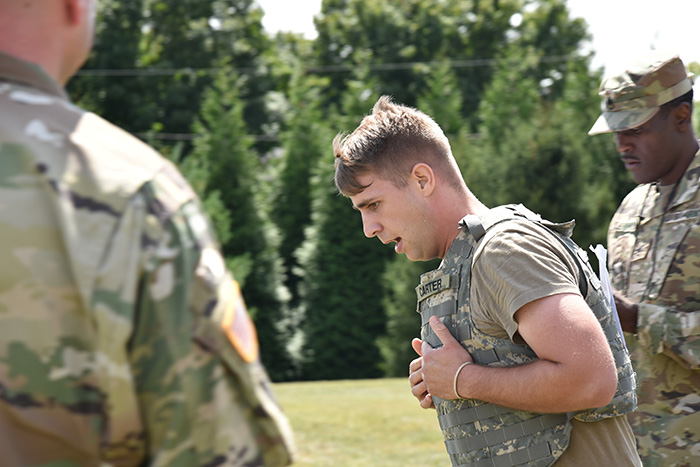USAMRDC Soldiers Rise Up, Dig Deep for Shot at Best Medic Glory
Just minutes after securing one of the two top slots in the U.S. Army Medical Research and Development Command's annual Best Medic Competition, Sgt. Jeffrey Carter struck a tone that belied the grueling intensity of the contest he'd just completed.
"I don't want to turn this into a Hallmark card," said Carter, a medic by trade who's stationed at the U.S. Army Medical Research Institute of Infectious Diseases at Fort Detrick, "but just to be lumped in with this crew, with this bunch of competitors – that's an honor in itself."
Standing within earshot, Staff Sgt. Daniel Tumey – the competition's other winner – offered a more straightforward take on the pair's accomplishments.
"It was a tough challenge," he said. "It feels good to get the payoff."
And yet to focus solely on that payoff – a chance for both to vie for the Army-wide Best Medic title in a few weeks' time – would be to ignore the near super-human effort that put both men in the winner's circle. Over a period of three action-packed days – from Monday, August 26 to Wednesday, August 28 – Carter, Tumey, and four other Soldiers from across the USAMRDC participated in a series of fitness, readiness, and stress tests designed to determine their medical care capacity in the most severe and austere environments.
"We're talking everything from timed runs to land navigation courses to trauma lanes," said Master Sgt. Todd Brenecki, one of the event's organizers. "And so the work these guys did over the past few days – this is how we have to be prepared to operate when we're deployed."
For the six participants, the simulation began before sunrise on the first day with the Army Combat Fitness Test on the rubberized track at Fort Detrick; an effort followed immediately by training at the Huntsinger Aquatics Center at nearby Hood College – all before traveling to Fort Indiantown Gap in Pennsylvania for an alternating series of ruck marches, firearms qualifications, land navigation efforts, and – sandwiched in between, somehow – a two-hour mass casualty drill. In all, Carter and Tumey estimate they were performing some type of medical maneuvers for 54 of the event's 72 total hours.
"Competitions like this are very important," said Fort Detrick Command Sgt. Maj. Timothy Sprunger while addressing the contestants at the event's closing ceremony at the Fort Detrick Auditorium. "Still, I don't think when you guys signed up for this event that you expected to get what you got."
For Carter, a previous Best Medic Competition winner, the event was a fair reflection of some of the more visceral realities of Army medical care.
"I was stationed in a far forward area when I was deployed," said Carter. "It was just me and one other person most times, so I'm familiar with providing aid in those types of situations with minimal support."

Though he has not previously been deployed, Tumey – who is currently stationed at the U.S. Army Aeromedical Research Laboratory at Fort Rucker, in Alabama – likewise trusts the event's immersive nature will ultimately serve him well.
"The expeditionary field care was the toughest part," said Tumey. "We were dragging 250 pounds and we really didn't know where we were – but I get it, I understand it."
For both winners, the next step is a trip to Joint Base Lewis-McChord near Tacoma, Washington, for the aforementioned 2019 Command Sgt. Maj. Jack L. Clark, Jr. Army Best Medic Competition in late September – an event which promises more of the same physical and mental challenges, though on a much larger scale.
As for Carter and Tumey, they'll hatch a plan of attack for their next test soon ... right after a shower, a meal, and some much needed sleep.
"Everything we did here was, honestly, a great time," said Carter. "But up there I'm expecting a whole lot more – harder conditions and tougher competitors."
U.S. Army Medical Research and Development Command 2019 "Best Medic Competition" Competitors
Sgt. Andres Rochaguzman, WRAIR
Sgt. Jeffrey Carter, USAMRIID
Staff Sgt. Mykola Usatenko, USAMRIID
Sgt. Brian McCoy, USAISR
Staff Sgt. Daniel Tumey, USAARL
Sgt. 1st Class Wayne Irion, USAARL
 An official website of the United States government
An official website of the United States government
 ) or https:// means you've safely connected to the .mil website. Share sensitive information only on official, secure websites.
) or https:// means you've safely connected to the .mil website. Share sensitive information only on official, secure websites.




